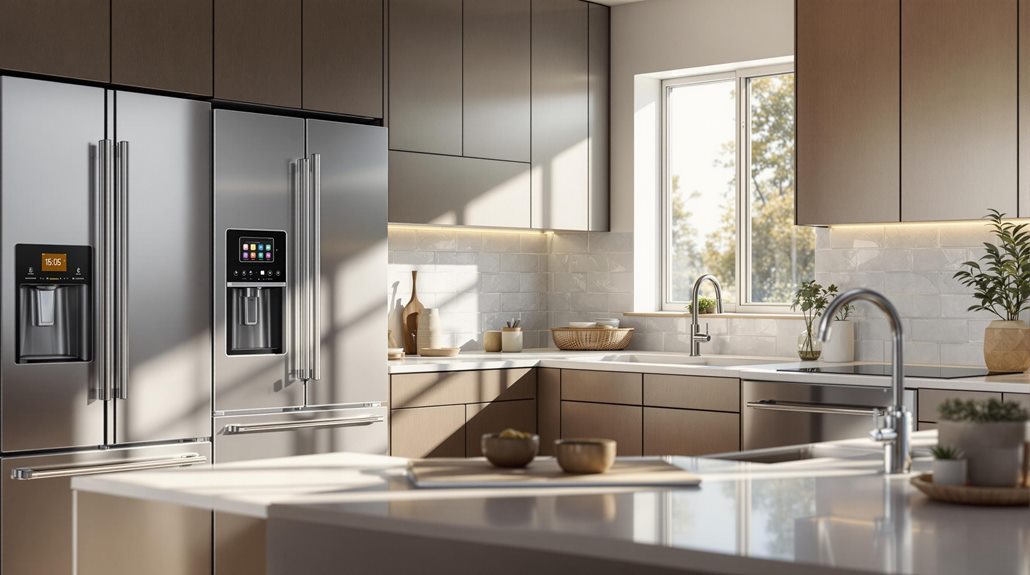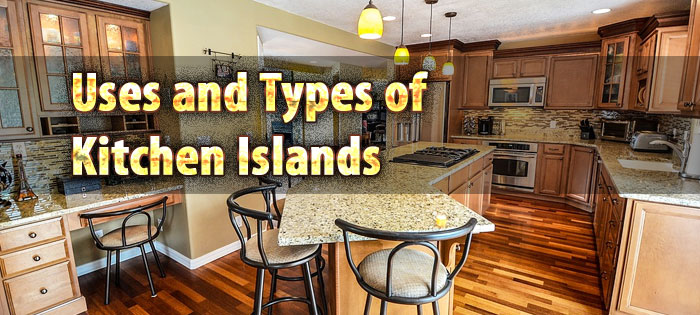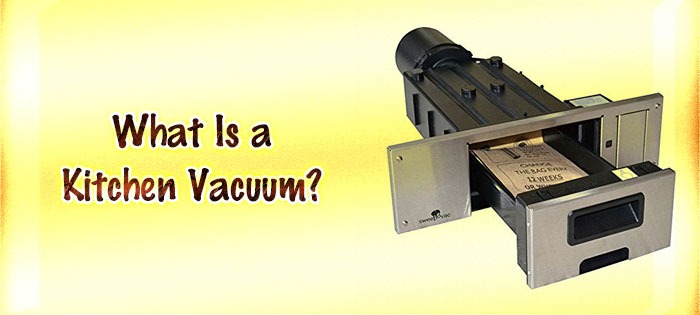How Much Does a Smart Kitchen Cost?

A complete smart kitchen upgrade will cost you between $4,000 and $16,000, with smart appliances making up the bulk of your expenses. You'll need to budget $2,000-$5,000 for a smart refrigerator, $300-$995 for a smart oven, and $429-$1,599 for a smart dishwasher. Don't forget installation costs of $400-$1,600, plus potential electrical and WiFi upgrades ranging from $700-$2,500. While the initial investment is significant, you can expect to save $200-$500 annually on energy bills. Understanding the full scope of costs and savings will help you make the smartest choices for your kitchen metamorphosis.
Basic Smart Kitchen Components
Inside a modern smart kitchen, the essential components typically include a smart refrigerator, oven, and dishwasher. When you're planning your kitchen remodeling costs, you'll need to account for these core smart appliances that form the foundation of your automated cooking space.
A smart refrigerator represents one of the biggest investments, ranging from $2,000 to $5,000, depending on the automation features you choose. You'll find smart ovens are generally more affordable, with prices starting at $299 and going up to $995 for models with advanced capabilities. Smart dishwashers fall somewhere in between, costing anywhere from $429 to $1,599.
If you're considering a complete smart kitchen automation upgrade, you should budget between $4,000 and $16,000. This significant range reflects the variety of options available in today's market. The final cost will depend on the specific brands you select and the sophistication of the automation features you want. Remember that each smart appliance comes with different technological capabilities, and you can customize your selection based on your needs and budget constraints.
Common Smart Appliance Costs
The cost breakdown for smart kitchen appliances ranges all the way up from basic models to premium products. When you're planning your smart kitchen renovation, you'll find that individual appliance costs vary drastically based on features and brands. A smart refrigerator represents one of the bigger investments, with price ranges from $2,000 to $5,000, while smart ovens are more affordable, running between $299 and $995. Smart dishwashers fall somewhere in the middle, with costs ranging from $429 to $1,599.
The total cost of converting your traditional kitchen into a smart kitchen depends on how many new appliances you choose to install. The average cost for a complete smart kitchen automation makeover typically falls between $4,000 and $16,000. This price variation reflects the different combinations of devices you might select and their respective quality levels. When budgeting for your smart kitchen, remember that these advanced appliances offer remote control and monitoring capabilities through your smartphone or voice assistant. This functionality can justify the higher costs compared to traditional appliances, as you'll gain convenience and enhanced control over your kitchen operations.
Smart Lighting Price Points

Lighting costs for a smart kitchen can vary dramatically, with individual smart bulbs ranging from under $3 to over $90 each. If you're planning to upgrade your kitchen's lighting fixtures with smart technology, you'll need to factor in the total number of bulbs required. While smart bulbs typically cost more upfront than traditional LED bulbs, they offer significant advantages in terms of control and functionality.
For an extensive smart lighting setup in your kitchen, you'll want to consider that even the most budget-friendly smart bulbs will cost over $100 to outfit an average home's worth of fixtures. If you opt for premium smart home devices, replacing all bulbs could reach up to $3,600. However, you'll save on installation costs since smart bulbs don't require professional installation - you can simply screw them in like regular bulbs. When planning your smart home technology budget, remember that kitchen lighting is just one component of a larger ecosystem. While the initial smart lighting costs might seem steep, they're generally more affordable than other smart kitchen upgrades, such as smart appliances that can run into thousands of dollars.
Installation and Labor Expenses
When planning your smart kitchen upgrade, installation and labor expenses can substantially impact your total budget. A professional installation typically costs between $400-$1,600, as electricians and handymen charge $50-$100 per hour for 8-16 hours of work.
Beyond the basic materials and labor, you'll need to consider several additional installation costs. Integrating smart devices with your home's electrical and network systems can add $500-$2,000 to your project. To ascertain your Smart Home functions properly, you might need to upgrade your internet and WiFi setup, which could cost $200-$500.
Don't forget about permits and inspections when planning a kitchen renovation. These indispensable requirements typically cost between $100-$500, depending on your local regulations. Professional programming services for features like voice control will add another $200-$500 to your bill.
To Save Money on installation expenses, ponder bundling services with a single contractor who can handle multiple aspects of the project. However, don't compromise on quality by choosing unqualified installers, as proper installation is pivotal for your smart kitchen's functionality and longevity.
WiFi Infrastructure Requirements

Along with smart appliances and fixtures, a sturdy WiFi infrastructure serves as the backbone of any modern smart kitchen. You'll need a reliable, high-speed internet connection to guarantee your smart devices can communicate effectively and perform their functions seamlessly within your smart home ecosystem.
When planning your WiFi infrastructure, consider key factors like your home's size, the number of connected devices you'll use, and your overall bandwidth needs. Many homeowners opt for fiber-optic internet or high-speed broadband connections to support their smart kitchen's data-intensive features. If you're experiencing connectivity issues in certain areas, you might need to invest in a mesh WiFi system or WiFi extenders to eliminate dead zones and maintain consistent coverage throughout your kitchen space.
Don't forget to factor in the monthly cost of your high-speed internet service when calculating your smart kitchen budget. While basic internet plans might seem sufficient, they may not provide the necessary bandwidth for multiple smart devices operating simultaneously. Choose an internet plan that matches your usage requirements to avoid connectivity issues and assure your smart kitchen functions at its best.
Power Usage and Energy Savings
While a strong WiFi network powers your smart kitchen's connectivity, the actual electrical consumption and potential savings deserve careful consideration. You'll find that smart kitchen appliances can slash your energy usage and utility costs by 10-30% compared to their traditional counterparts.
Smart refrigerators lead the way in energy savings, offering $50-$150 in annual electricity cost reductions through their advanced temperature controls and efficient compressors. You'll also benefit from smart ovens and cooktops that optimize energy usage while reducing cooking time by 15-25%. Smart dishwashers contribute to your savings too, using intelligent sensors and precise water distribution to cut yearly utility costs by $30-$60.
When you implement a complete smart kitchen ecosystem, including automated lighting and climate control alongside your smart appliances, you're looking at substantial savings. The combined effect can reduce your annual energy bills by $200-$500. This means your initial investment in smart kitchen technology doesn't just deliver convenience and modern features – it actively works to offset costs through reduced energy consumption and improved efficiency throughout your kitchen space.
Maintenance and Replacement Considerations

The long-term costs of maintaining a smart kitchen extend far beyond the initial installation. Smart kitchen appliances typically last between 5-10 years, and you'll need to plan for their eventual replacement to keep your connected kitchen running smoothly.
When calculating the cost of your kitchen maintenance, you should factor in monthly cloud service subscriptions, software updates, and repairs, which can range widely from $100 to $500 annually. The replacement costs for individual components can be substantial, with new smart appliances costing anywhere from $1,000 to $5,000 each.
Technology obsolescence is another indispensable consideration in your maintenance planning. As newer systems emerge, your existing smart appliances may become incompatible, potentially forcing a complete kitchen overhaul. These Remodeling Costs can reach $20,000 to $75,000 or more, depending on the scope of work and complexity of ordering materials. To avoid unexpected financial strain, you should set aside a dedicated budget for both routine maintenance costs and eventual replacements. This proactive approach will help maintain your smart kitchen functional and worthwhile throughout its lifecycle, while preventing technological incompatibility issues down the road.
Financing and Budget Planning
Planning a smart kitchen upgrade requires careful consideration of your financing options and budget constraints. You'll need to evaluate various funding sources, including home equity loans, personal loans, or credit card financing, to determine which best suits your financial situation. When developing your budget plan, account for both immediate costs and long-term benefits, such as increased energy efficiency and enhanced home value.
Working with a kitchen designer or contractor can help you create a realistic budget that covers all necessary components:
- Smart appliances and devices (refrigerators, ovens, dishwashers)
- Automated lighting systems and controls
- Security features and monitoring systems
- Required electrical and connectivity infrastructure upgrades
Your thorough budget should range from $4,000 to $16,000, depending on the scope of your smart kitchen project. Consider starting with essential smart features and gradually expanding your system over time if budget constraints are a concern. Remember that you'll likely recover some of your investment through reduced energy costs and increased property value. When exploring financing options, compare interest rates, terms, and monthly payments to choose the most cost-effective solution for your smart kitchen transformation.




